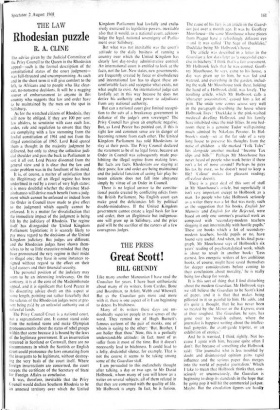Rhodesian puzzle
THE LAW R. A. CLINE
The advice given by the Judicial Committee of the Privy Council to the Queen in the Rhodesian appeal—such is the formal description of the constitutional status of the court judgment— was full-throated and uncompromising. As such and in the short term it will give comfort to the left, to Africans and to people who like clear- cut, no-nonsense decisions. It will be a nagging source of embarrassment to anyone in this country who suggests that law and order have to be maintained by the men on the spot in Salisbury.
As for the wretched citizens of Rhodesia, they will now be obliged, if they are 100 per cent law abiders, to scrutinise with care each law, order, rule and regulation to ensure that they are complying with a law stemming from the lawful constitution of 1961 and not from the illegal constitution of 1965. Lord Reid spared them a thought in the majority judgment he delivered, but only to shrug the collective judi- cial shoulder and pass the buck to Parliament to sort it all out. Lord Pearce dissented from the general view and it is clear that the law and order problem was in the forefront of his mind. It is, of course, a matter of satisfaction that the illegitimacy of an illegal regime has been underlined in red by a court of very high status;
it is more doubtful whether the detainee Mad- zimbanuto will derive much benefit from a judg-
ment which cannot be enforced or indeed from the Order in Council (now made to give effect to the judgment) which equally cannot be enforced. It is a matter for dissatisfaction that the immediate impact of the judgment is being felt by the judiciary of Rhodesia. The regime itself has disregarded the United Kingdom Parliament legislation; it is scarcely likely to pay more regard to the decisions of the United Kingdom judiciary. But judges are different, and the Rhodesian judges have shown them- selves to be so little executive-minded that they have pronounced the very regime in their midst an illegal one; they have in some instances re- signed without regard to the effect on their legal careers and their financial security.
The personal position of the judiciary may seem to be an interesting irrelevancy. On the contrary. it is at the core of the Madzimbanuto appeal, and it is significant that Lord Pearce in his dissenting advice dwelt on this aspect at some length, pointing out rather forcefully that the salaries of the Rhodesian judges were at pre- sent being paid by an unlawful authority out of unlawful funds.
The Privy Council Court is a national court, not a supranational one. It cannot stand aside from the national scene and make Olympian pronouncements about the status of rebel groups within that scene because it is bound by the laws of the legitimate government. If an insurrection occurred in Scotland or Cornwall, there are no circumstances in which the Scottish or English court could pronounce the laws emanating from the insurgents to be legitimate, without destroy- ing the very basis of the court itself. Where foreign insurrections are concerned, the court accepts the certificate of the Secretary of State for Foreign Affairs as conclusive.
It was, therefore, inevitable that the Privy Council would declare Southern Rhodesia to be an annexed territory over which the United
Kingdom Parliament had lawfully and exclu- sively exercised its legislative powers, inevitable also that it would, as a national court, acknow- ledge the legal, national sovereignty of Parlia- ment over Salisbury.
But what was not inevitable was the court's attitude to the daily business of running a country over which the United Kingdom has clearly lost day-to-day administrative control. An international court is entitled to look at the facts, not the law. New states, new governments. are frequently created by force or disobedience and international law has to digest these un- comfortable facts and recognise what exists, not what ought to exist. An international judge can lawfully act in this way because he does not derive his authority and power to adjudicate from any national authority.
But can a national court give limited recogni- tion to the acts of a breakaway government in defiance of the judge's own sovereign? The Privy Council has given an emphatic negative. But, as Lord Pearce has pointed out, if this is tight law and common sense are in danger of becoming remote from each other. The United Kingdom Parliament has told Rhodesians to stay at their posts. The Privy Council declared the statement to be of no legal force, because an Order in Council was subsequently made pro- hibiting the illegal regime from making laws. But facts are facts. Rhodesians are staying at their posts; law and order are being maintained and the judicial function of seeing fair play be- tween citizens does not fall into abeyance simply by virtue of an Order in Council.
There is no logical answer to the constitu- tional puzzle created by conflicting edicts from the British Parliament. No English court can make good the deficiencies left by political double-mindedness. If the United Kingdom government cannot create a legal basis for law and order, then an illegitimate but indigenous one will grow up in Salisbury, and the price paid will be the sacrifice of the careers of a few courageous judges.






































 Previous page
Previous page